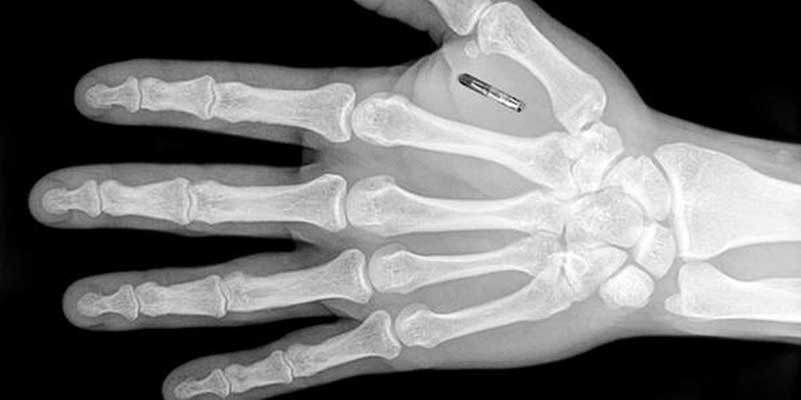Gradually, everything around us is getting connected to the Internet; smart factories, autonomous cars, smart toothbrushes, E-bikes, clothing and pacemakers. We call this ‘The Internet of Everything’, because we will connect almost anything to the increasingly faster internet. We can now switch on the smart lamp via our Smartphone. Or we can make our Tesla, which is parked in Rotterdam, honk while we enjoy a leisurely afternoon at a sidewalk cafe in New York.
In the future, our smart fridge will notify our self-driving car when our food runs out and the autonomous vehicle will then collect our groceries from the supermarket’s pickup point. Of course, before that, our fridge has already checked in with our smart-pill to make sure we get the foods that are most healthy for us. Thanks to technology, we will see the emergence of a future of endless possibilities, making our lives a lot easier. As trend watcher and futurist I hold many talks about all these technologies at conferences around the world. But you can only really understand the real impact of it when you’re actually physically part of this connected world. So I decided to have some chips implanted in my body. The first one was a RFID chip. The video below shows how it was inserted under my skin.
Free trendservice
Ten years from now, everyone will have one or more implants.
I predict that within ten years, every Dutch citizen will have one or more chips or implants, simply because it is convenient, useful or, in some cases, even necessary. There are several reasons. Technology in our body makes us healthier, smarter and it makes our lives a lot easier. Based on some concrete examples, I want to show you what we can expect.
Chips that make us healthier
Monitoring our health is crucial to our survival. If we are able to intervene in time and change certain values in our body, we will live much longer. In future, the electronic pill will be swallowed by everyone and measure dozens of values in our bodies – alerting our health practitioners if there are any problems. Smart algorithms analyse the data stream coming from our body and these algorithms also extract data from, for example, IBM’s Watson, which has already ‘swallowed’ millions of medical pages and diagnoses. For the use of the pill, signals and data, we will pay a fixed amount per month – giving us a guarantee on lifelong health. And what do you think of the smart molar? Sensors in the molar keep tabs on our body and inject medication directly into the blood; preventing us from getting sick. When children get their adult teeth, a smart molar can be implanted to intervene when health problems arise. Or how about a birth control chip, which is implanted under a woman’s skin to release hormones at specific times to prevent pregnancy
Chips that make us smarter
Our brains haven’t received any significant ‘updates’ in the last 50.000 years. My Apple, however, received an update with a smarter and faster operating system last weekend. So how do we become smarter through technology? Could a Google-like brain implant be a solution? The implant would allow for the doubling of our short-term memory and connect external sources (such as law-books, websites or customer data) to our current memory. If there are things we can’t remember, our brain would download new information and nano crawlers would look for the right information in databases, old books or online discussions. This concept is not totally unfounded. Actually, several projects have already been funded by the US Pentagon based on this idea! Would a type of ‘pacemaker’ for your brains be the solution to brain diseases such as Parkinson’s? One of the projects that the Pentagon is seriously engaged in, is the development of computer chips that are placed in the brains of soldiers to suppress the symptoms of PTST (post traumatic stress disorder).
Chips that make it easier
It’s not always easy to supervise employees. Implants can help companies monitor employees at maximum load with less downtime as a result. And how useful would it be if employees no longer needed keys? An RFID chip could be a solution for thousands of security staff to enable them to enter all locations without the use of keys. I recently had a speaking engagement at a conference in Belgium, and while I was there I had a conversation with the manager of one of the largest cleaning companies in that country. Due to the many employees and large number of contracts, building and registrations, this company would really benefit from having their employees RFID chipped. Huge ‘g-forces’ were released early this year, however, when a Swedish company wanted to chip all its 700 employees.
I recently had a speaking engagement at a conference in Belgium, and while I was there I had a conversation with the manager of one of the largest cleaning companies in that country. Due to the many employees and large number of contracts, building and registrations, this company would really benefit from having their employees RFID chipped. Huge ‘g-forces’ were released early this year, however, when a Swedish company wanted to chip all its 700 employees.
The Belgian company used the Swedish example as a lesson and decided on fitting their employees’ shoes with the chips. Of course, this type of identification raises many privacy concerns. But what would happen if certain employers make this mandatory in the future? In 2015, transportation will look a lot more practical than it is now. By that time, I will definitely have a GPS chip in my body that is in contact with my digital agenda. Small self-propelled ‘pods’ will automatically show up at my current location and transport me to my next destination. And if the ‘pod’ has no passengers scheduled for the afternoon, it can make itself useful delivering or collecting parcels.
Chips. Do we need to be afraid?
We might be of the opinion that having chips implanted in our bodies is very convenient; at the same time we find it terrifying. We are quite happy with sensors on our bodies (such as fitbits), but as soon as intelligence is injected into our bodies (even if it’s just under the skin) it becomes a different story. And that is understandable! And what about security? Let’s fantasise about the autonomous car. Imagine the entire family merrily on their way to a dinner party. Suddenly the car’s intelligence is hacked, and it ends up colliding with a truck. We may or may not survive the accident. But what if our pacemaker gets hacked? That would mean certain death – a different story altogether.
Below is the Mindshift radio broadcast. You can listen to cyber security specialists’ responses to the topics discussed; a hacker tells us how easy it is to hack implants, and the scientific director of the privacy and identity lab at Radboud University, Henk-Jaap Hoekman talks about facing major challenges. Some hospitals and doctors did not respond to this development. If you want to get some more in-depth information, have a look at biohack.me. It’s an excellent starting point. Want to read more about trends? Visit my blog.
Until the next Mindshift.
Share via:




